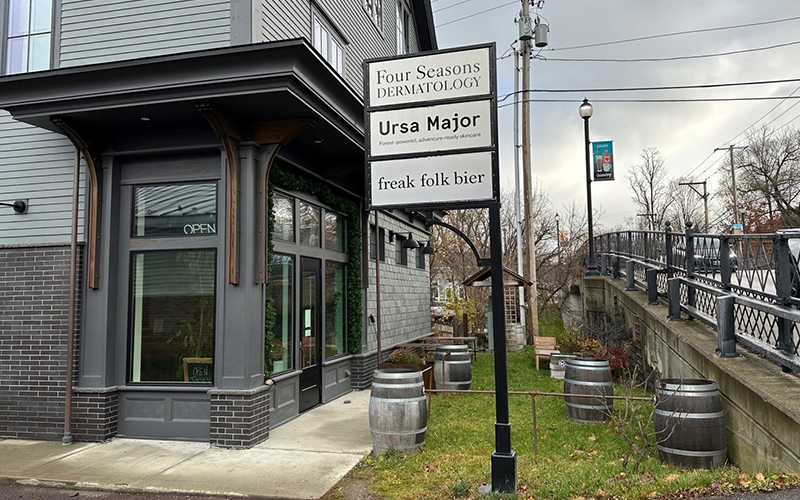Beer lovers know Vermont for the amber ales and sweet stouts of its craft breweries. But those hops-filled tanks hide a dirty secret: The sludge of golden-barley wastewater left over from the beer-making process often strains local water treatment plants and can harm the state’s waterways.
Freak Folk Bier, which opened in Waterbury in early 2022, crafts oak-fermented, mixed-culture beers. Last month, the brewery received a grant from the Vermont Department of Environmental Conservation’s wastewater management program that would pay for upgrades to keep its sludge out of the waste stream.
The grant came from $3.3 million in funding from the American Rescue Plan Act, intended to provide relief to states in the wake of the COVID-19 pandemic. Gov. Phil Scott channeled the money toward improvements in municipalities and businesses’ handling of wastewater.
Waterbury’s wastewater treatment plant sits just northwest of downtown on U.S. Route 2 and releases outflow into the Winooski River.
With the $23,896 state grant, Freak Folk Bier would build a permanent, weather-proof tank that would house its wastewater, instead of sending it to the treatment plant, said Ryan Miller, the brewery’s co-owner. The effluent would be trucked to a facility that handles strong waste, such as Casella Waste Systems.
MANAGING POTENT WASTE
Beer makers use up to eight gallons of water to make a gallon of product.
“Brewery waste is up to 50 times more potent than normal household waste,” said Bill Woodruff, Waterbury’s public works director.
Waste potency is determined by biological oxygen demand, the level of dissolved oxygen needed to break down organic material in water. The sugar and starch floating in the water also has higher nitrogen and lower pH than typical wastewater. Woodruff notes it proves difficult for waste treatment plants, which have to use more chemicals and aerators for longer periods to decompose the waste in the water.
Because Waterbury’s plant releases its treated water into the Winooski River, improperly treated waste would threaten the river’s ecosystem, ultimately dumping troublesome waste into Lake Champlain, exacerbating algae blooms and other pollution problems downstream.
How well breweries deal with waste depends on their size and their determination to work a water treatment plan into their process. Large breweries – those that produce at least 25,000 gallons of waste a day – must have a wastewater pretreatment permit from the state.
Alchemist Beer and Prohibition Pig are among the breweries that save the drains from sludge and biowaste. According to Alchemist’s website, since 2011, they have side-streamed strong waste packed full of sugar and grains into large containers that are picked up daily by Casella at each of their locations in Waterbury and Stowe. The waste is delivered to either Gebbie’s Maplehurst Farm in Greensboro, or Purpose Energy in Windham, New Hampshire, where it is converted into energy.
For small breweries such as Freak Folk Bier, the state hasn’t considered those special permits a necessity. Smaller operators must meet their local treatment center’s requirements for general pollution prevention and have some kind of plan to handle waste. Most small breweries typically handle their waste well and don’t cause problems for local treatment centers, Woodruff said.
Freak Folk wouldn’t have to change its building infrastructure or pipe system to incorporate the storage improvement, Woodruff said. The grant ideally would give the business an incentive to make those changes, he added.
So far, it’s unclear whether Freak Folk Bier will accept the grant money and make the changes. Miller said the brewery may move to a different location, making the investment in the new system unnecessary.
“I don’t really know if we’re going to accept the grant,” Miller said, adding that he and co-owner Lillian MacNamara are considering many ideas for the business’s future. One option could be a move, although the owners have made no decision to leave Waterbury at this time, Miller said.
Community News Service is a program in which University of Vermont students work with professional editors to provide content for local news outlets at no cost.













